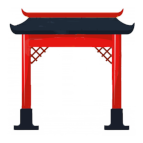Memory phrase for the character: 故
故
Meaning
reason, cause, intentional, therefore, hence Pronunciation
gù
gu4
Explanation Left: old 古 (image of a tomb stone), right: strike 攵/攴 (hand 又 with a stick 卜)
Mnemonic
show English
If the old (man) hits, then intentionally and with a reason. Radicals
古
ancient, old, former Originally derived from the picture of a skull, hence "old". But the idea of a burial mound is also helpful.
攴
rap, strike Shows originally a hand 又 with a whip 卜. It is usually simplified to 攵. Other radicals with a hand are: 又寸廾爫手扌
Vocabulary
段荃法 Duàn Quán fǎ
622
事故 shì gù
accident
624
因故 yīn gù
for some reason
958
故意 gù yì
deliberately; on purpose
1028
缘故 yuán gù
reason; cause
3202
故障 gù zhàng
malfunction; breakdown; defect; shortcoming; fault; failure; impediment; error; bug (in software)
3203
欲擒故纵
yù qín gù zòng
In order to capture, one must let loose.; to loosen the reins only to grasp them better
7287
欲擒故纵
yù qín gù zòng
Japanese kanji, please follow this link .
List of the characters | List of the radicals

 彐右及尹君聿隶兼殳
彐右及尹君聿隶兼殳